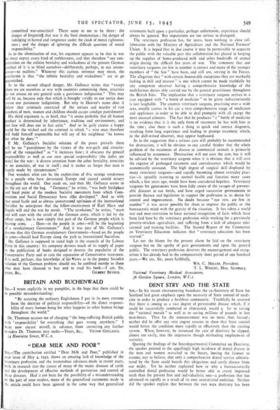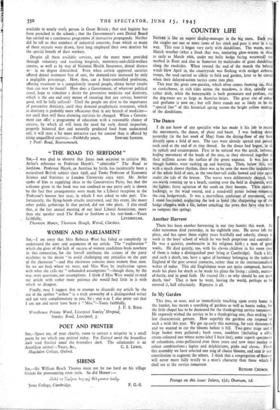DENT STRY AND THE STATE
SIR,—In his recent electioneering broadcast the ex-Secretary of State for Scotland laid great emphasis upon the necessity of State control of medi- cine in order to produce a healthier community. Truthfully he asserted that there is among us a vast degree of preventable disease which, if it could be successfully combated or eliminated, would g far to raising the "national morale" as well as to saving millions of pounds in lost man-hours. Thus far the announcement was no more than Factual; neither did he offer any very cogent reasons to show that State contiol would better the condition more rapidly or effectively than the existing system. When, however, he instanced the case of dentistry he slipped, almost too easily, into the impressive though misleading employment of statistics.
Quoting the findings of the Interdepartmental Committee on Dentistry, the speaker pointed to the appallingly high incidence of dental disease in the men and women recruited to the forces, leaving the listener to assume, nay to believe, that only a comprehensive dental service adminis- tered by the State could banish this ubiquitous and costly disease from our midst. Yet he neither explained bow or why a bureaucratically controlled dental profession would be better able to create improved teeth than the present free and individualistic one—a profession that has advanced so rapidly as a result of its own unrestricted ambition. Neither did the speaker explain that between the two wars dentistry has been available to nearly eveiy person in Great Britain ; that oral hygiene has been preached in the schools ; that the Government's own Dental Board has carried on a continuous programme of instructive propaganda. Neither did he tell us that numbers of industrial concerns, from which so many of these recruits were drawn, have long employed their own dentists for the special benefit of their workers.
Despite all these available services, and the many more provided through voluntary and teaching hospitals, maternity-and-child-welfare centres, as well as by way of National Health Insurance, dental disease wr- in no degree diminished. Even when certain approved societies offered dental treatment free of cost, the demand-rate increased by only a negligible percentage. How, then, can a State-controlled profession, offering treatment to a compulsorily insured people, obtain better results than can now be found? How does a Government, of whatever political creed, hope to stimulate a desire for preventive medicine and dentistry, which is the one and only means of ensuring that any service, however good, will be fully utilised? Until the people are alive to the importance of preventive dentistry, until they demand prophylactic treatment, which in dentistry is probably more efficacious than in any branch of medicine— not until then will these alarming statistics be changed. When a Govern- ment can offer a programme of education with a reasonable chance of success by which all will learn the need for early dental inspection, properly balanced_ diet and naturally produced food from undoctored soil, it will state a far more attractive case for control than is offered by
citing unqualified statistics.—Faithfully yours, EDWARD SAMSON. 7 Poole Road, Bournemouth.



























 Previous page
Previous page